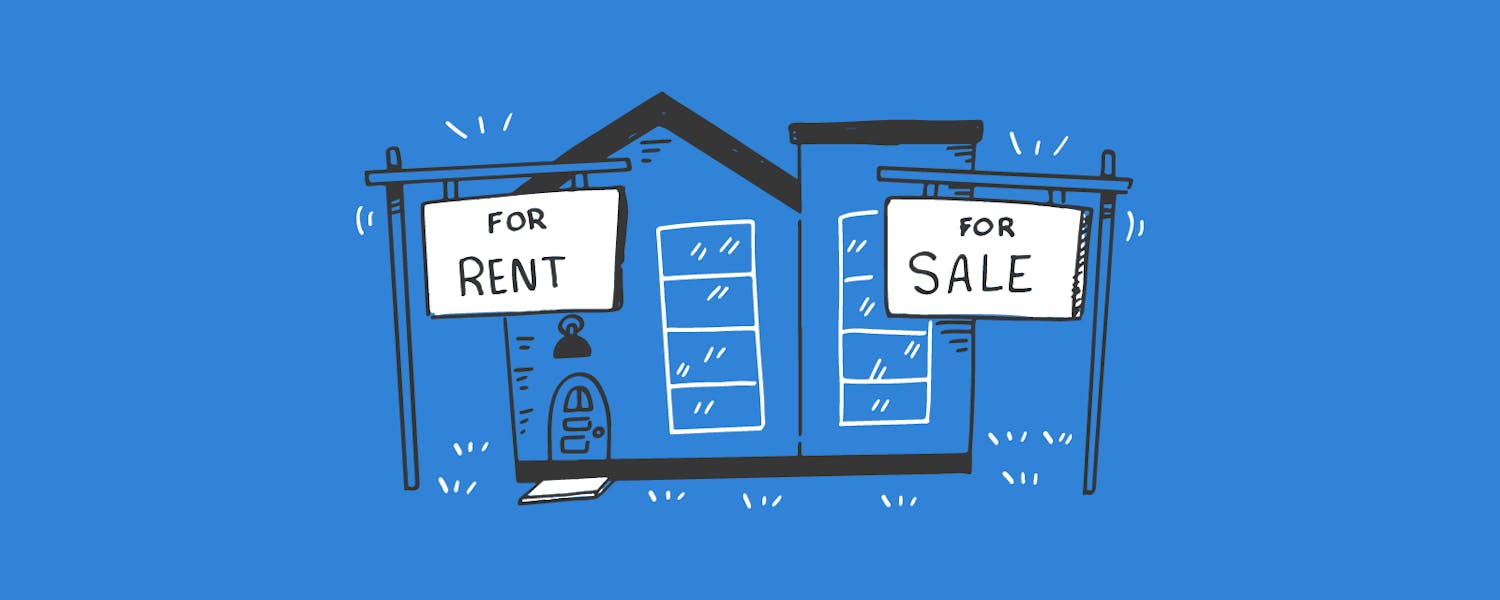When to rent & when to buy a house
It’s the American dream to purchase a home, but is it right for everyone? A common debate is whether renting or buying a house is better.
It's not a one-size-fits-all decision since each person has different circumstances.
In other words, homeownership isn’t right for everyone.
It comes down to being at the right place at the right time and doing the legwork to find a home in an area that will provide you with a great return on your investment when you decide to buy.
Real estate market trends fluctuate often, but knowing when to jump in and invest is the key.
As you choose between renting and buying, here’s what to consider.
Rent vs. Buy Overview
Choosing to rent or buy is a big decision with long-term consequences.
Envato/formatoriginal
| If you buy | If you rent |
|
You have less freedom to move around and are responsible for more expenses, but you may earn capital gains from the home equity and have tax write-offs with property ownership.
|
You minimize your financial obligations, but have nothing to show for the money spent over the years. Renting also allows you to move as often as your lease terms allow.
However, rent prices typically increase annually, again without anything to show.
|
There's nothing that says renting is ALWAYS better than buying, or buying is ALWAYS better than renting. It depends on many circumstances.
Considerations When Comparing Renting vs. Buying a House
When deciding to rent or buy, there are three main factors: personal finances, your lifestyle, and career plans.
1. Personal Finances
Personal finances are a key player in whether renting or buying makes more sense. Buying a home is a long-term investment.
You invest capital (the down payment) plus are responsible for all aspects of the home, including repairs, maintenance, taxes, and insurance.
You must consider what might happen in the future.
For example, if you take an adjustable rate mortgage and your rate adjusts, you may not be able to afford it or refinance, leaving you with a mortgage you can't afford.
No one can predict the future or how much your income may change.
Envato/innu_asha84
If you don’t have the capital to invest in a home or worry about your income, renting may be a better option.
Of course, it's not without its costs, but you aren't responsible for maintenance, repairs, real estate taxes, or homeowner's insurance (you may opt for rental insurance).
2. Lifestyle
Your lifestyle plays a role in whether renting or buying makes more sense. Ask yourself:
- Am I ready to settle down for 5 – 7 years? This is the typical time it makes sense to keep a house for when buying.
- Will we outgrow the house fast? If you plan to get married or have kids soon, buying right now may not make sense unless it's large enough to accommodate your short-term goals.
- Do I like to move around? Some people don’t like to be stuck in one place. Buying a house makes moving often more difficult (and costly), so renting may make more sense if you prefer to move every year or two.
Envato/drazenphoto
3. Career
Think about where you're at in your career. Are you settled and planning to stay in it for the foreseeable future, or are you still wandering, trying to figure out what you want to do long-term?
If you haven’t settled yet, you may consider renting to allow more freedom as you determine where you want to work.
If you’re in your long-term career, and it has a solid future, buying can be a better option as it can be one of the first and most significant investments you make in your future.
The Financial Aspect of Renting vs. Buying a House
The most important consideration when choosing buying vs. renting is the financial aspect.
In addition to the initial capital needed to buy a home, there are more ongoing financial concerns to consider.
|
Financial Considerations When Renting |
Financial Considerations When Buying |
|
Renting doesn’t require as many financial considerations as buying. Most renters need:
|
The financial considerations for buying are much greater and include:
In addition, you should consider these varying costs:
|
When creating your budget, be sure to include all possible costs of purchasing a house to ensure you can comfortably afford all costs.
Using the 5% Rule to Choose to Rent or Buy
If you’re looking for a tried-and-true rule to help you determine if you should rent or buy, consider the 5% rule.
This rule, created by Ben Felix for the Canadian real estate market, but can apply to any market.
The 5% rule helps you compare the cost of buying vs. renting. If the cost to rent a similar home is less than 5% of the home's value, it makes sense to rent, and if not, buying makes more sense.
In the 5%, Felix assumes:
1% of the value is paid in taxes
1% of the value is the maintenance/repair costs
3% of the value is the mortgage payments plus the cost of capital (down payment)
If rent in the area is less than the 5% cost, renting may make more financial sense than buying.
Final Thoughts
Deciding to rent or buy is more than a financial decision.
It also depends on your lifestyle, plans, and career.
Of course, a big part depends on what you can afford and the type of responsibility you want to assume.
Renting is still a big financial responsibility, but you can get out of it easier and move on faster renting than you can buying.
However, buying allows you to take advantage of capital appreciation and certain tax deductions that renters don't get.





